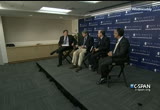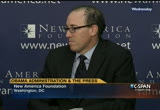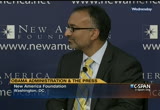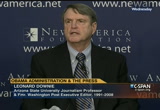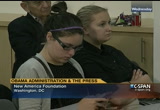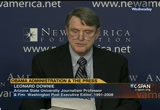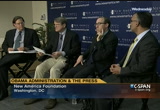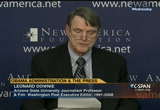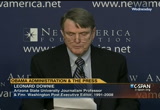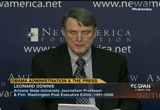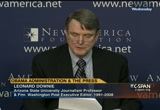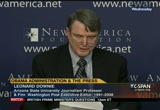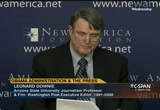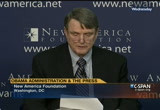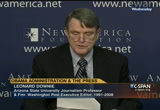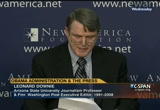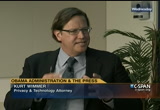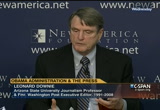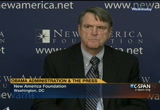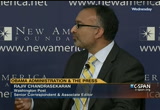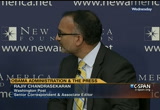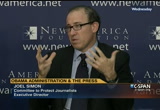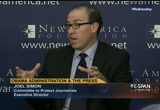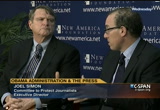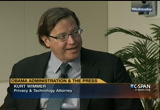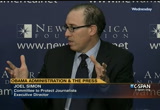tv British House of Commons CSPAN October 20, 2013 9:35pm-10:01pm EDT
9:35 pm
here along with these experts. i think i'm the only person on this panel i've never heard of. [laughter] this is one of those panels were everyone needs no introduction, but we do it anyway. to my left is len downie jr., professor at arizona state. very well known to this audience, of course, as vice president at large of the "washington post." he spent 44 years -- is that right? in the washington post newsroom. my apologies. to his left -- joel simon, the executive director of the organization that published this exceptional report we will be talking about today. he was appointed as the executive director in 2006.
9:36 pm
he was responsible for launching the global campaign against impunity. and finally, to joel's left is rajiv chandrasekaran, also well known to this audience from his long-standing work with "the washington post." he is currently the senior correspondent and associate editor of "the washington post." he wrote "imperial life in the emerald city," a terrific piece of work that became a movie with matt damon. he has been journalist in residence at the international reporting project at the johns hopkins school for advanced studies in washington. today, i would like to start off
9:37 pm
if you would give us an overview of the reports today. >> quickly at the outset, i would like to say the question of reporters being subpoenaed was brought up. yesterday or the day before, james risen of the new york post lost his appellate case. it is in the report, when you find his name. this appellate court decision has now gone against him. that will probably go to the supreme court, which will be a major, major test of the relationship between reporters and sources. what rights do reporters have not to give away their sources? that could be a very important supreme court case a year or so, however long it takes.
9:38 pm
i was asked to do this report because i had written a few things for the washington post last year, may of this year about the obama administration, the very aggressive way they have been going after government officials who have provided information to reporters, particularly classified information, but not exclusively. i was asked by the committee to explore the relationship between the obama administration and the press in this context of the kinds of work, the relationship between governments and the press and the press's right to work. i was surprised by what i found. it goes way beyond the war on leaks. i have found this administration to be remarkably controlling. i will tell you how that happened.
9:39 pm
my findings are based on several dozen interviews. news executive, government transparency advocates, government officials. plus, there is a study that i did -- i think these are the most complete accounts that anyone has come up with. during the bush and obama administrations -- so we can make comparisons, and the application of the patriot act and the national surveillance programs. the obama administration's aggressive war on leaks and its efforts to control the flow of information -- is without equal since the nixon administration and indirect conflict with president obama's often stated goal of making his administration the most transparent in american history. i should say that i was one of
9:40 pm
the reporters on the watergate story in the early 1970's. i make that comparison with knowledge. there are six components of what i found. an unprecedented number of leak and investigations. the obama administration officials and employees are increasingly afraid to talk to the press. every single journalist i have talked to says that is the case, whether or not they deal with classified information. six government employees and to government contractors, including edward snowden of course, have been prosecuted since 2009 for leaking classified information to the press. that is the most since the 1917 espionage act enacted during world war i to punish people for spying for foreign entities.
9:41 pm
here we have reporters -- people being prosecuted under that act for talking to reporters. the most cases since 1917, 90 years, when they began under the obama administration. probably the most frightening thing for government officials the justice department and the fbi has been successful in secretly issuing subpoenas for communications between journalists and sources including fox news and the associated press. the attorney general is allowed to refuse to notify the media about subpoenas and communication records. this is a very big loophole.
9:42 pm
the journalist shield legislation suggested by the president and recently approved test similarly broad acceptance of national security information, although judges would make a final decision on this leaving the attorney general. also in doubt, how would you find a journalist to be covered by the law? in this digital age, what is a journalist is very broad. anyone can be a journalist of one kind or another. there is a concern -- joel may talk about this. defining who a journalist is could lead to the government licensing to say you are a journalist or you are not, depending on what they want they. journalists say that many sources will not talk to them at all. and this is not just the
9:43 pm
investigation in which there have been routinely lie detector tests given to government officials. reporters naturally do not want to get into trouble. the insider tips program. in the aftermath of the revelation of leaks to wikileaks in the news media, president obama ordered and insider tips program throughout the government. not many people know about this. people have been told to monitor "any suspicious outside activity including communications with the press." the director of the project on government secrecy tells me this has created internal surveillance and made people conscious of contact with
9:44 pm
advocates in the press. the third issue -- all incoming administrations have held a message for political advantage, but senior officials of this administration have what they call "unauthorized contact with the press discouraged." they do not want any kind of leaks to the news media, not just those including classified information. reporters are most often referred to public affairs officials who are unresponsive and abusive. they sometimes will refuse to provide reporters public information that we all have a right to. president obama has repeatedly promised creating government websites and social media operations. it restricts the government
9:45 pm
accountability to the press. the websites are full of government created content. pictures of president obama taken by the white house press photographer when all other photographers are banned. this is one of my favorites. there is a full newscast called west wing week. it is supposed news coverage of those events. and then you have social media promoting the administration views. former cnn reporter and director of the school of the media public affairs told me that the aim is to in news media completely. if used for propaganda purposes, like to avoid contact with journalists, this is a mixed result.
9:46 pm
part of the problem reporters have is calling someone to ask a routine question and expect a routine answer and it turns out the information is classified. there seems to be no good reason for it. the obama administration has taken credit for posting on the new community website -- previously secret documents explaining the nsa surveillance program. but it only did so after the revelation in documents released by edward snowden. the administration has not acted on a congressionally authorized board which recommended many specific steps to carry out the president's professed aim which would free government officials to discuss more public business with the press. the fifth issue is the failure to appear before the freedom of information act office.
9:47 pm
this was a directive issued on the president's for day in office to improve government responsiveness of foia requests. too many government departments and agencies still reject far too many foia requests or delay response or demand expensive fees to fulfill them. an associated press survey earlier this year found the number of foia requests turned down had increased during the obama administration. 80 organizations that advocate for government transparency -- the aim of the obama administration is reputedly out to make the foia work better for
9:48 pm
the public. they are worried about whether the administration will listen to them. whistleblowers. president obama has also said he supports protecting government whistleblowers who reveal government waste, fraud, and abuse. but he and his administration draw a disturbing distinction between that and the revelation of policies and action which they punish with investigations, firing, and prosecution. president obama signed the whistleblower act of 2012, aims with protecting from retaliation government whistleblowers including state department employees. at the same time his administration won an appellate or decision in august that takes away from many federal employees and eliminates the right to appeal, including the retaliation for whistleblowers. it classifies whistleblowers as spies under the 1975 espionage
9:49 pm
1917 espionage act. the president's position is very unclear to me. lastly, the international implications. in addition to the threat posed to the work of foreign journalists by nsa surveillance which of course spies on american reporters. they can spy on the communications of foreign citizens. the obama administration press policies provide a questionable example for other countries at a time when this administration has been outspokenly advocating for freedom of the press and other parts of the world. president obama faces many challenges in his remaining time in office obviously, the outcome of which will shape his legacy. one goal he could accomplish would be to make his administration the most transparent in history.
9:50 pm
that is the sum of it. >> thank you very much. i would like to invite anyone tweeting about our discussion to use the hashtag #obamainthepress. this report we together a lot of disparate threads about the administration. it seems to be a conflict between government and the press in that we recognize the government has secrets to keep and will try hard to keep them. we would try hard to get them. the ones that were newsworthy and relevant and should be published, we would. it seems in your report, you're not talking -- you are now talking about an administration that has stepped over the line between those two areas, essentially chilling the ability of any members to speak to the press. >> there are two things to say
9:51 pm
about that. first of all, there is the decision by the supreme court. if you are in the administration, you cannot stop it. you can always punish sources afterward. that is important to keep in mind. secondly, 9/11. a lot changed after 9/11. including the whole balance between exactly what we're talking about -- between revelations of government activity and national security and that balance. during the bush administration, we published reports. there were a lot of conversations with administration officials. those conversations were useful. they did continue during this administration, but in a somewhat different atmosphere. the third thing is when the
9:52 pm
obama administration came into office, they were put under great pressure by the intelligence agencies who were upset by previous stories. they put a lot of pressure on the obama administration to do something about it. it these investigations began under bush. these organizations have both democrats and republicans on the hill. also i believe the president himself -- he has not really spoken about this -- the president himself, he said something about he does not want secrets revealed that will put our boys at risk. there's not a lot we can do about that. >> so, rajiv, joel, what you think of the explanations? it's pretty compelling. >> it is. particularly as an editor
9:53 pm
oversees the publication for some of the stories over time, you look back at the cia story, you look back at what was wiretapping and the bush administration responses to those. those decisions and discussions that led up to this, particularly how the administration has responded, how they have compromised their view on national security, and yet in most of the cases there have been expressions of disgust, if you will. perhaps cursory investigations. but nothing of the sort we see now. and you look at the investigation that has taken place in recent years and you compare them to some of the
9:54 pm
previous stories -- it seems like it is penny-ante stuff. going after tom drake at the nsa, which you write about or the risen case. those things -- those stories did not have a meaningful impact on american national security. and yet, those are some of the cases being pursued or have been pursued with particular vigor. so, it really has been a fundamental change in the approach taken by the government in recent years compared to the preceding decades on this. >> i would also argue the cases mentioned by rajiv --it was not whether the nsa program was too expensive and protected privacy. it was not about the content whatsoever.
9:55 pm
>> and the documents found in his home were not classified documents, and yet they still went after him. the case eventually fell apart. >> obviously, it is a very significant contribution we have seen, the attention it has gotten. when some of these investigations -- people were aware of them, aware of these policies, but putting them all together suggests this is not a haphazard response to certain particular events. there is a systematic effort here to marginalize and undermine the work of the press. i think that is what the report really accomplishes. what i want to do is also talk about, what is the significance of that? cpj has been around since 1881.
9:56 pm
-- 1981. journalists work around the world. they have to fear for their lives. they go out and do a story. the recognition is that journalists in this country have unique protection of the first amendment. in our early years, we focused on that. those reporting efforts. but, you know, the recent events in this country -- and also our conversation with journalists covering this administration led us to conclude the atmosphere was fundamentally different. that not only had an impact on the atmosphere of fear, but the potential for journalists.
9:57 pm
the u.s. press is in some ways the world's press. any erosion on the press here has an impact on people around the world. secondly, the u.s. press inspires journalists around the world. third, government takes solace from any deterioration in this country, gives them the ability to take repressive actions on their own. we asked len to carry this report and asked him to do this independently. these are independent findings. we took the report and reviewed it both among our staff and provided recommendations based on work done independently and
9:58 pm
that was the process. >> this is an organization that not only devotes resources and skill, but also investigating and seeking action against journalists murdered in the philippines. and for cpj to devote resources to shining a light on these issues and the thoughtful investigation of them is a remarkable step for international press freedom. >> that is true and the obama administration, like many administrations, focuses a lot on trying to promote free expression in other countries. what you think that the issues catalogue here due to our credibility in other countries? >> i have a specific example. we had a case of president obama
9:59 pm
communicating to prime minister erdogan in turkey. turkey is a strategic ally. they have a deep relationship with the united states. a strategic relationship. so, we had been advocating for some time that president obama speak directly with prime minister erdogan. they had a bilateral meeting back in may. i think the day before that took place, the news about the -- seizure of the ap phone records broke. i have no idea if that was on the agenda. if president obama had raised that, i think -- the same sort
10:00 pm
287 Views
IN COLLECTIONS
CSPAN Television Archive
Television Archive  Television Archive News Search Service
Television Archive News Search Service 
Uploaded by TV Archive on

 Live Music Archive
Live Music Archive Librivox Free Audio
Librivox Free Audio Metropolitan Museum
Metropolitan Museum Cleveland Museum of Art
Cleveland Museum of Art Internet Arcade
Internet Arcade Console Living Room
Console Living Room Books to Borrow
Books to Borrow Open Library
Open Library TV News
TV News Understanding 9/11
Understanding 9/11